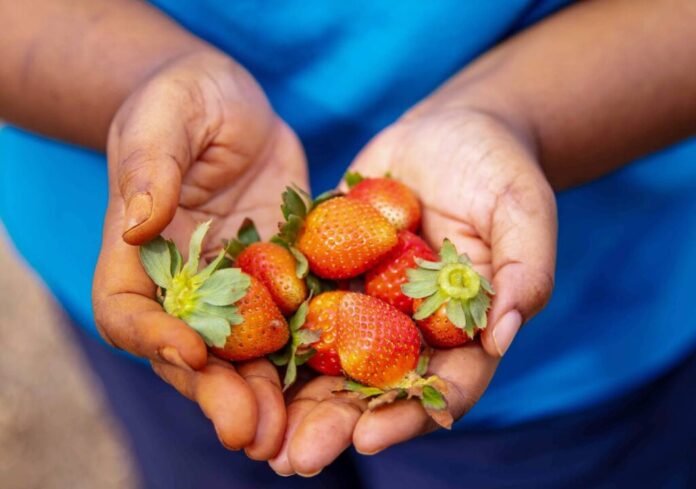From Ruin to Resilience: Trishawna Brown’s Strawberry Success Story
In the lush hills of Potsdam, St. Elizabeth, Trishawna Brown is turning tragedy into triumph. Just weeks after receiving vital support from the United Nations Development Programme (UNDP), she’s reaping strawberries—a crop she once dreamed of cultivating.
Nestled over 2,000 feet up in Jamaica’s Santa Cruz mountains, Brown’s flower farm thrived in a cool climate, but it also faced the wrath of nature. Hurricane Beryl, a Category 4 storm, struck on July 3, 2024, leaving destruction in its wake. “I lost a lot of plants, and my house was damaged,” she recalled, her voice tinged with the pain of loss. “It set us back in income.”
As a single mother of two, the storm’s aftermath was particularly daunting. “I don’t have any fatherly support, so it was hard to come back,” she explained. With her greenhouse in ruins, her thoughts turned to survival—shelter for her family and school fees for her children.
The UNDP stepped in, recognizing the unique challenges faced by women farmers like Brown. “One-third of all farmers in Jamaica are women,” noted Minister of Agriculture Floyd Green. “They make significant contributions but face heightened vulnerabilities.”
Brown was among 54 women selected for the UNDP’s livelihoods recovery programme, which provided essential inputs like drip irrigation systems and training. “This support has helped my farm, especially during this drought season,” she said, her eyes lighting up with hope.
With the new equipment, Brown began her strawberry farming journey, a venture she had long aspired to. “I started off with two fruits, then a dozen, and now I’m picking pounds,” she shared, excitement bubbling in her voice. The market is hungry for local strawberries, and with imports filling the gap, the potential for profit is immense.
Meanwhile, in Manchester, another resilient woman, Keisha Wint, is also on the road to recovery. A blind single mother, Wint faced her own challenges after Hurricane Beryl wiped out her chicken stock. “I love my own money; I don’t like to depend on people,” she declared, embodying the spirit of determination. With support from the UNDP, she received baby chicks and materials to expand her coop. “The profit is good because prices have gone up since Beryl,” she said, her pride evident.
Maya Biggs, a poultry farmer from Clarendon, shares a similar story. After losing her livelihood to the hurricane, she received support to restock her chickens and rebuild her coop. “This has pushed my business further,” she said, her optimism shining through. “It sends the kids to school and puts food in the house.”
These stories highlight the importance of a gender-inclusive approach to disaster recovery. “Vulnerable persons can fall off the radar if we don’t make an extra effort to include them,” said UNDP Resident Representative Dr. Kishan Khoday.
As these women rebuild their lives, they are not just creating a better future for themselves but also for their communities. Brown dreams of employing others and leaving a legacy for her children. “I want to provide for my kids and create opportunities for them,” she said, her heart full of hope.
With the support of organizations like the UNDP, the resilience of women like Trishawna, Keisha, and Maya shines brightly. Their journeys remind us that even in the face of adversity, hope and determination can lead to a fruitful future. What will the next chapter hold for these inspiring women?

